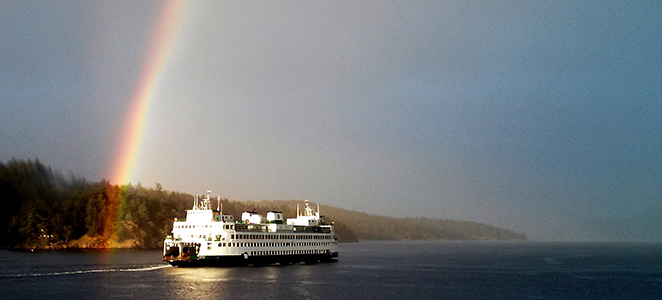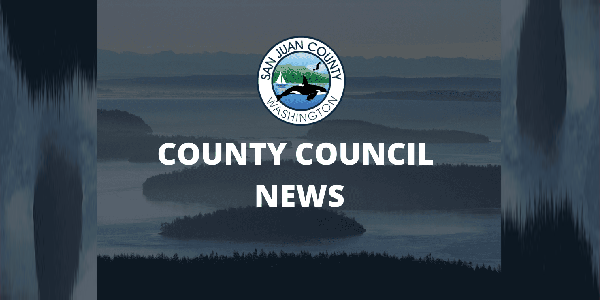||| FROM DANA L. WARR for WASHINGTON STATE FERRIES |||
Washington State Ferries (WSF) is committed to increased reliability on the San Juan Islands’ Interisland route, but faces significant challenges, sometimes daily, in doing so. We hope this overview helps our customers understand both our commitment and our challenges.
At the beginning of every sailing season, every WSF vessel is fully crewed. Vacation relief requests are filled, and we’re ready to go. However, if someone calls in at the last minute due to illness, childcare issues, or even a flat tire on the way to work, we cannot sail until their position is filled. This year, the legislature provided us with new funding to add an Ordinary Sailor (Deck) and Oiler (Engine Room) to every sailing. But if we don’t have the U.S. Coast Guard-required crewing to cover those positions, we can’t sail until the relief request is filled. This is particularly challenging on the Anacortes/San Juan Islands and Interisland routes due to the distance from where most WSF employees can afford to live.
Unlike other vessels in our fleet, the interisland vessel is homeported in Friday Harbor, a location inaccessible by road to most of our crew. This makes it extremely difficult to find relief crew members when regular crew members are unavailable. For crew members living outside the Anacortes area, commuting to Friday Harbor adds at least five hours to their day, making it less appealing for them to take shifts on the interisland route. As a result, they prefer to work overtime on routes that homeport in Anacortes or elsewhere in the system, where accessing their watch is less time consuming.
WSF has implemented several measures to address these interisland route relief challenges. We’ve contracted with a charter boat service to transport crew members directly between Anacortes and Friday Harbor, easing the burden of the lengthy commute. We’ve introduced wage incentives for crew members who take shifts on the interisland vessel. However, it’s important to note that we cannot force crew members to work overtime. Our on-call pool, often criticized as a barrier to hiring, is necessary to cover staffing needs across our routes. The reality is that when offered a choice between shifts in Mukilteo and Friday Harbor, most crew members will choose the more convenient option in Mukilteo.
Since service on the Interisland route is a priority and part of our first restored routes, we’ve explored options to alleviate this issue, such as homeporting the interisland vessel in Anacortes. However, this solution would require the vessel to make at least four calls in Anacortes every day, significantly reducing interisland service and displacing jobs for crew members currently living on the islands. Those who live on the islands are our most reliable source of staffing for the interisland route. Unfortunately, the high cost of living and limited housing availability on the islands makes it difficult for potential crew members to relocate. WSF will work with SJI County officials to explore housing options for WSF employees.
Evening cancellations can occur because the Interisland is so far behind schedule if it doesn’t tie up, its crew will run over their U.S. Coast Guard daily hours and not be available to work the next day. These delays can be due to weather, waiting offshore for another vessel to leave a terminal, medical emergencies, law enforcement activity, and the mundane like someone locking their keys in their vehicle, delaying offloads and boarding. With new sailing schedules set to begin with the winter 2025 season, we will alleviate tight crew change schedules and have more realistic crossing and dwell times, which will not only improve on-time-performance, but also the risk of crews reaching their daily work limits.
While we’ve added these incentives for interisland relief, we’ve also worked to improve our communication and adjust when the boat does tie up. Three times a day—at 10 a.m., 1 p.m., and 7 p.m.—the web agent on duty checks with Dispatch to see if there are any open relief requests for the interisland. If there are, passenger alerts are sent out, so customers can catch the boat while it’s still operating. This is especially important for county workers and students commuting to school in Friday Harbor, ensuring they can get home if the last roundtrip of the day doesn’t sail.
We’ve also developed alternate schedules to alert the public to additional stops being made by vessels assigned to the Anacortes/San Juan Islands routes, helping them get to their destinations during service disruptions.
The impact of these staffing challenges is evident in our service data. In a 20-day period in August, out of 1,585 scheduled sailings on the three Anacortes vessels and the interisland vessel, we completed 1,475 sailings. While the Anacortes-based vessels maintained high reliability, with only 15 cancellations out of 1,083 sailings, the interisland route had 110 cancellations out of 502 scheduled sailings. We understand that even one canceled sailing is unacceptable, and we know that island communities rely heavily on our service. We take that responsibility seriously and are committed to continuing to explore solutions that will make the interisland vessel more reliable.
As our crewing constraints ease and crew members start vying for shifts to meet their 40-hour workweek, rather than having more vacancies than crew, we expect this situation to improve. Combined with the steps outlined above, this will lead to more reliable service for our interisland customers. Everyone at WSF understands the impact of any interisland cancellation, and we’re focused on making it more reliable.
**If you are reading theOrcasonian for free, thank your fellow islanders. If you would like to support theOrcasonian CLICK HERE to set your modestly-priced, voluntary subscription. Otherwise, no worries; we’re happy to share with you.**








The best part about this is they don’t pay engineers 5 hours of travel time . Yet they admit it takes 5 hours
Because the impacts to our economy and to our daily lives are so impactful, I would like our County Councilors to consider partially subsidizing housing for interisland ferry crew.
There was a time when many of the Washington State ferry boats carried crew members above the legal minimum required by the COI (US coast guard Certificate of Inspection). Some years back a cost cutting decision was made to strip all the boat crews to the barest legal minimum. This has proven repeatedly to be a significant factor with boats not sailing due to “short crew”
Sometimes these positions were referred to as “training positions” and included both engine and deck departments. In this scenario, if someone did not report for duty the “extra” crew member could often fill in to satisfy the COI. As things stand today if the lowest rank member of crew is late for work, the boat can not sail.
It should be noted that at WSF there are provisions to allow for a “bump up” in rank; this means that in the event somebody doesn’t show up, an ordinary seaman can bump up to AB, an AB can bump up to mate and a mate can bump to captain, (assuming of course the one bumping up has the proper credentials). At WSF, and the merchant marine in general, most sailors are working toward advancing their career in the industry. This means crew often hold credentials for a higher rank than that which they are employed.
It’s good to see this post/communication and the replies. The State may want to consider, in its tool box of incentives, agreeing to pay otherwise qualified staff to “break in” on the inter island boats. It’s my understanding that State has not agreed to offer the break in training week with pay, or at least not to the broader available staff. Staff are not as motivated to train for the break in period (12 hour days 7 days strait plus travel) when it means they need to do so for free on their own off time from their regular schedule.
Wasn’t Governor Inslee just on San Juan Island to meet and greet our officials? Has WSF service improved over the 10 plus years he has been at the head of our State Government? Or has it declined?
Were hard questions ask of him by our officials and what were his answers?
It’s pretty clear that despite the significant state taxes we pay in SJC that we are the lowest of the low in terms of priority at WSF. Once we accept that no one is going to save us but ourselves, we will finally invest in our own interisland transportation system. Kitsap county is showing the way.